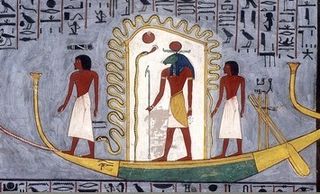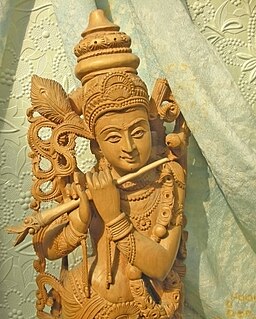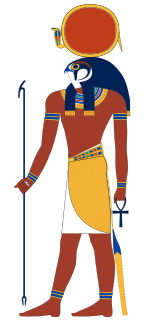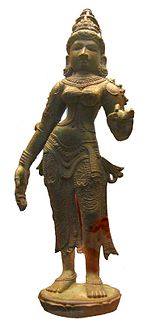Sources
- ↑ Donald A. Mackenzie (1917). Myths of Crete and Pre-Hellenic Europe.
- ↑ Cf. "M thru S gods" from Witchology Waxing and "Hail, Niskai" from Find a Goddess.
Niskai is a term used to refer to any of the water spirits and goddesses in Celtic mythology. [1] Niskai are also considered goddesses in Neo-Paganism. [2]

A goddess is a female deity. In many known cultures, goddesses are often linked with literal or metaphorical pregnancy or imagined feminine roles associated with how women and girls are perceived or expected to behave. This includes themes of spinning, weaving, beauty, love, sexuality, motherhood, domesticity, creativity, and fertility. Many major goddesses are also associated with magic, war, strategy, hunting, farming, wisdom, fate, earth, sky, power, laws, justice, and more. Some themes, such as discord or disease, which are considered negative within their cultural contexts also are found associated with some goddesses. There are as many differently described and understood goddesses as there are male, shapeshifting, or neuter gods.

Atum, sometimes rendered as Atem or Tem, is an important deity in Egyptian mythology.

Sia or Saa, an ancient Egyptian god, was the deification of perception in the Heliopolitan Ennead cosmogony and is probably equivalent to the intellectual energies of the heart of Ptah in the Memphite cosmogeny. He also had a connection with writing and was often shown in anthropomorphic form holding a papyrus scroll. This papyrus was thought to embody intellectual achievements.

Leather Goddesses of Phobos is an interactive fiction video game written by Steve Meretzky and published by Infocom in 1986. It was released for the Amiga, Amstrad CPC, Amstrad PCW, Apple II, Macintosh, Atari 8-bit family, Atari ST, Commodore 64, TI-99/4A and MS-DOS. The game was Infocom's first "sex farce", including selectable gender and "naughtiness"—the latter ranging from "tame" to "lewd". It was one of five top-selling Infocom titles to be re-released in Solid Gold versions. It was Infocom's twenty-first game.

Shaktism is one of several major Hindu denominations, wherein the metaphysical reality is considered metaphorically a woman and Shakti (Mahadevi) is regarded as the supreme godhead. It includes many goddesses, all considered aspects of the same supreme goddess. Shaktism has different sub-traditions, ranging from those focused on most worshipped Durga, gracious Parvati to that of fierce Kali.

In Ancient Egyptian religion, Taweret is the protective ancient Egyptian goddess of childbirth and fertility. The name "Taweret" (Tȝ-wrt) means "she who is great" or simply "great one", a common pacificatory address to dangerous deities. The deity is typically depicted as a bipedal female hippopotamus with feline attributes, pendulous female human breasts, the limbs and paws of a lion, and the back and tail of a Nile crocodile. She commonly bears the epithets "Lady of Heaven", "Mistress of the Horizon", "She Who Removes Water", "Mistress of Pure Water", and "Lady of the Birth House".

The Goddess movement includes spiritual beliefs or practices which emerged predominantly in North America, Western Europe, Australia, and New Zealand in the 1970s. The movement grew as a reaction to perceptions of predominant organized religion as male-dominated, and makes use of goddess worship and can include a focus on female people, or on one or more understandings of gender or femininity.

Leather Goddesses of Phobos 2: Gas Pump Girls Meet the Pulsating Inconvenience from Planet X! is a graphic adventure game written by Steve Meretzky and published by Activision in 1992 under the Infocom label. LGOP2 is the sequel to the 1986 interactive fiction game Leather Goddesses of Phobos, also written by Meretzky. LGOP2 featured full-screen graphics and a point-and-click interface instead of Infocom's text parser.

A grāmadevatā is the presiding deity or guardian deity, usually a goddess, worshipped in villages in India. Although grāmadevatās are most often goddesses, there are a few notable male exceptions. Dharma-Thakkur is a god of fertility and disease in West Bengal state of India. Another example is found in Kal Bhairav, a fierce form of Lord Shiva is the grāmadevatā in the rural villages of Maharashtra, where he is referred to as Vairavar.

Sarpanit was the consort of Marduk, the main god of Babylon, and a goddess of birth. She was already attested as the wife of Marduk before his ascension to the top of the Mesopotamian pantheon, appearing in inscriptions of the Babylonian kings Sumulael and Samsu-iluna. Some researchers regard her simply as one of the "prototypical divine wives."

In Hinduism, there are diverse approaches to conceptualizing God and gender. Many Hindus focus upon impersonal Absolute (Brahman) which is genderless. Other Hindu traditions conceive God as bigender, alternatively as either male or female, while cherishing gender henotheism, that is without denying the existence of other Gods in either gender.
Matrikas also called Matar or Matri, are a group of mother goddesses who are always depicted together in Hinduism. The Matrikas are often depicted in a group of seven, the Saptamatrika(s). However, they are also depicted as a group of eight, the Ashtamatrika(s).

Ra or Re was the ancient Egyptian deity of the sun. By the Fifth Dynasty, in the 25th and 24th centuries BC, he had become one of the most important gods in ancient Egyptian religion, identified primarily with the noon-day sun. Ra was believed to rule in all parts of the created world: the sky, the Earth, and the underworld. He was the god of the sun, order, kings and the sky.

Devī is the Sanskrit word for 'goddess'; the masculine form is deva. Devi and deva mean 'heavenly, divine, anything of excellence', and are also gender-specific terms for a deity in Hinduism.

Tutu was an Egyptian god worshipped by ordinary people all over Egypt during the Late Period. The only known temple dedicated to Tutu is located in ancient Kellis. However, reliefs depicting Tutu are seen in other temples, such as the Temple of Kalabsha. Tutu's title at the Shenhur temple was "Who comes to the one calling him". Other titles of his are "Son of Neith," "the Lion," "Great of Strength", and "Master of the demons of Sekhmet and the wandering demons of Bastet".

The Tridevi is a concept in Hinduism joining a triad of eminent goddesses either as a feminine version of the Trimurti or as consorts of a masculine Trimurti, depending on the denomination. This triad is typically personified by the Hindu goddesses Saraswati, Lakshmi, and Parvati. In Shaktism, these triune goddesses are the manifestations of Mula-Prakriti or Adi Parashakti.

Đạo Mẫu is the worship of mother goddesses which was established in Vietnam in the 16th century.

The Legend of Zelda: Symphony of the Goddesses was a concert tour featuring music from Nintendo's The Legend of Zelda video game series. Jason Michael Paul Productions, who was licensed by Nintendo to produce and tour the show, hired Jeron Moore to produce the show as well as Composer Chad Seiter to create the music. The tour is named after the Golden Goddesses in the Zelda series.